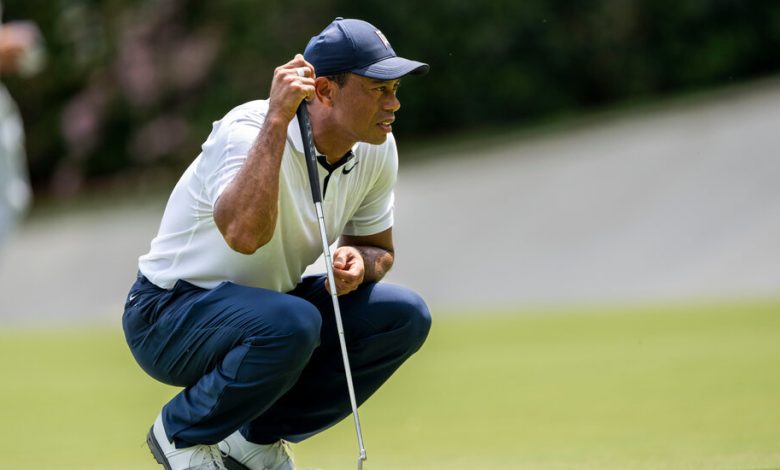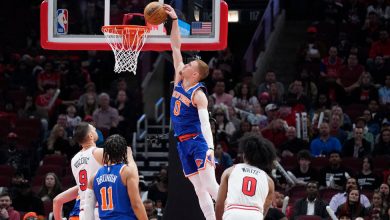Tiger Woods Joins PGA Tour Board in Concession to Player Demands

Infuriated after being blindsided by the PGA Tour’s pact with Saudi Arabia’s sovereign wealth fund, a band of leading golfers has won a series of concessions from the beleaguered circuit’s commissioner — including the elevation of Tiger Woods to the tour’s board — in a star-driven rebuke of the tour.
The tour announced the changes on Tuesday, one day after dozens of top players wrote to Jay Monahan, the tour’s commissioner, and insisted on significant overhauls.
The players, including Woods, Patrick Cantlay, Rickie Fowler, Rory McIlroy, Jon Rahm and Scottie Scheffler, said that the secret negotiations toward a tentative deal with the wealth fund had defied the principle that the tour should be committed to players and run by them. In turn, Monday’s letter detailed demands that amounted to a dramatic effort to reclaim power over a circuit that got its modern start after a player rebellion in the late 1960s.
Woods, the golfers said, had to be installed on the tour’s board promptly, giving the players a sixth seat, and allowing them to outnumber the independent board members who come from the worlds of business and law. And the players insisted that one of their advisers, Colin Neville of the merchant bank Raine, have sweeping access to the tour’s files while executives try to reach a final deal with the wealth fund.
A lasting agreement with the wealth fund, they signaled, would not clear the board unless Neville was able to review the terms with the players.
“This is a critical point for the tour, and the players will do their best to make certain that any changes that are made in tour operations are in the best interest of all tour stakeholders, including fans, sponsors and players,” Woods said in a statement.
“The players thank Commissioner Monahan for agreeing to address our concerns, and we look forward to being at the table with him to make the right decisions for the future of the game that we all love,” Woods added. “He has my confidence moving forward with these changes.”
Sustained support for Monahan was no certainty entering the week. In a striking show of force, more than 40 players, including Woods, the five sitting members of the board and the 16 members of an important advisory council, signed the letter to Monahan.
Player outrage over the deal with the wealth fund began about as soon as it was announced in June. The tour hailed the agreement, which seeks to create a new for-profit entity combining the Saudi-backed LIV Golf league with the commercial operations of the tour and the DP World Tour, formerly the European Tour, as a step forward for a divided sport.
But players had, at most, hours of warning about the deal.
Instead, Monahan and two independent board members, James J. Dunne III and Edward D. Herlihy, handled the talks with the wealth fund on the tour’s behalf without informing other board members. A handful of players, including board members like McIlroy, were told of the agreement shortly before it was announced. Most of the rest of the tour’s players found out about it when it became public.
Time did not diminish their misgivings.
“We still don’t really have a lot of clarity as to what’s going on, and that’s a bit worrisome,” Scheffler, the world’s top-ranked player and a golfer normally eager to stay out of the tour’s internal politics, said last month. “They keep saying it’s a player-run organization, and we don’t really have the information that we need.”
In recent weeks, according to a person with knowledge of the deliberations, players have spoken privately about the changes they would want to see from the tour to which they had remained loyal. Monday’s letter to Monahan reflected those conversations, and Monahan swiftly agreed.
The commissioner and his tour have been the targets of ferocious criticism, in part because an agreement with the Saudis had seemed so improbable after a year marked by acrimony.
In 2022, LIV began poaching top tour players, including Brooks Koepka, Phil Mickelson and Dustin Johnson, starting an all-out war for the future of golf. Players sued the PGA Tour, saying it had illegally discouraged players from joining LIV, and the tour countersued. The tour also highlighted Saudi Arabia’s human rights record at every turn, with Monahan memorably asking on national television, “Have you ever had to apologize for being a member of the PGA Tour?”
The tentative agreement ended the litigation between the parties, but otherwise lacked many substantive binding commitments. That hasn’t halted the intense questioning about how the tour’s campaign against the Saudis so quickly morphed into an embrace that leaves the wealth fund poised to hold enormous sway over golf.
Lawmakers in both the House and Senate are targeting the tour’s tax-exempt status, and tour leaders went before a congressional subcommittee last month to answer questions about the agreement. The Department of Justice is scrutinizing whether the tour violated antitrust law, scrutiny that has already scuttled one part of the deal.
But the players have always been among the biggest roadblocks to a final agreement. When LIV offered exorbitant sums to players to defect — LIV’s chief executive Greg Norman has said that Woods turned down north of $700 million — many decided to stick with the tour. They spoke with disdain for LIV’s team golf concept, its weaker fields and even the length of its events, and joined the chorus accusing Saudi Arabia of using golf to burnish its image.
Then came the agreement and, soon, the uprising.
The tour said last week that Neville, the banker, would advise the players on a potential deal and that they would have a say in choosing a new independent board member to replace Randall Stephenson, the former AT&T chairman who resigned after being left out of the loop on negotiations with the Saudis. The tour also said it was devising a “financially significant” plan to compensate players who did not take LIV’s money, and it signaled again that LIV players who want to return to the tour were likely to face penalties.
Monday brought a new set of demands and swift acquiescence from tour leaders.
A board seat for Woods is no guarantee of player unanimity, however. What the richest and best known players in the world want out of a final agreement could differ from what the fringe tour professionals, who are far more numerous, desire.
Woods, who won his 15th major championship in 2019 but has rarely played since because of major injuries, has declined to join LIV and bitterly criticized its style of play, but his views on a potential agreement with the investment fund are unknown. He has not said anything publicly about the tentative agreement, and his agent, Mark Steinberg, has not responded to multiple requests for comment.
No current player, though, commands as much public influence as Woods — just as no current player has as much private power as he does. Even during his convalescence, Woods has remained in close touch with some tour golfers, many of whom attribute the circuit’s financial success and contemporary popularity almost entirely to Woods.
“When Tiger speaks, his voice is very loud,” Gary Woodland, a U.S. Open winner who turned professional in 2007, said in an interview in June.
The players believe that Woods’s arrival on the board, which also includes the P.G.A. of America’s president, will do much to reassure the particularly restive ones in their ranks, some of whom have lately considered potential paths to challenge the tentative agreement with the wealth fund.
Players are expected to meet with Monahan next week, when the tour will hold an event in Memphis.



